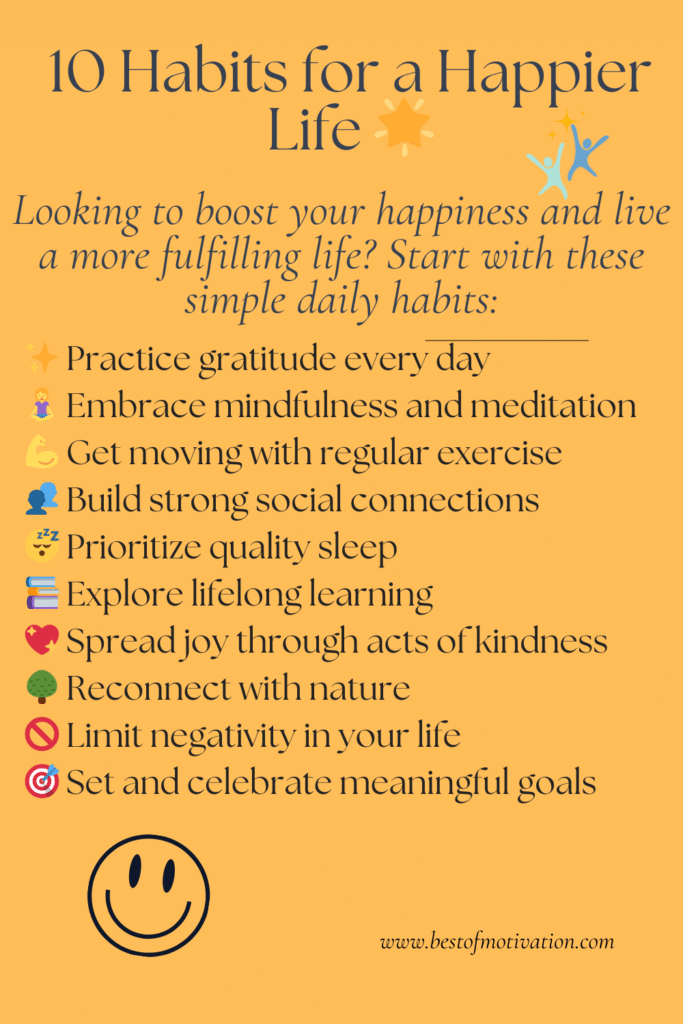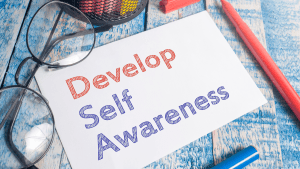Happiness is a universal pursuit. While external circumstances influence our mood, the key to sustained happiness lies within our habits. By cultivating daily habits for happiness, you can transform your outlook and embrace a more joyful, fulfilling life. This guide explores ten proven habits for a happier life, offering actionable tips, relatable examples, and scientific insights to help you implement these positive lifestyle changes.
1. Practice Gratitude Daily
Definition and Relevance
Gratitude is the act of recognizing and appreciating the good in your life. Studies show that grateful individuals are more optimistic and experience greater emotional well-being. It shifts focus from what’s lacking to what’s abundant.
Actionable Tips
- Start a gratitude journal: Write down three things you’re thankful for every day.
- Verbally express appreciation to someone who has impacted your life.
- Create a “gratitude jar” to store positive memories or notes of appreciation.
Real-World Example
Sarah, a busy teacher, began journaling about small daily wins, like a student’s smile or a kind compliment. Over time, she noticed a shift in her mindset and found herself happier, even on challenging days.
Supporting Evidence
A study published in Personality and Individual Differences found that practicing gratitude improves psychological health and reduces stress. Source.
2. Embrace Mindfulness and Meditation
Definition and Relevance
Mindfulness is the practice of being present in the moment without judgment. It helps reduce stress and fosters a sense of inner peace, contributing to long-term happiness.
Actionable Tips
- Dedicate 5–10 minutes daily to deep breathing or guided meditation apps like Calm or Headspace.
- Practice mindful eating by savoring each bite and avoiding distractions.
- Engage in grounding exercises, such as focusing on your senses.
Real-World Example
James, a software developer, began meditating for 10 minutes each morning. The practice helped him approach stressful situations calmly, enhancing his overall mood.
Supporting Evidence
Research in JAMA Internal Medicine indicates that mindfulness meditation can alleviate symptoms of anxiety, depression, and pain. Source.
3. Exercise Regularly
Definition and Relevance
Physical activity boosts endorphin production, improving mood and reducing feelings of anxiety. It’s a cornerstone of positive lifestyle changes.
Actionable Tips
- Choose an activity you enjoy, such as dancing, swimming, or hiking.
- Set realistic goals, like a 20-minute brisk walk three times a week.
- Use apps or trackers to stay motivated and monitor progress.
Real-World Example
Emma, a marketing executive, incorporated a 15-minute yoga routine into her mornings. She noticed increased energy and a better mood throughout the day.
Supporting Evidence
A meta-analysis in Health Psychology Review revealed that exercise is associated with reduced depressive symptoms and enhanced emotional well-being. Source.
4. Cultivate Strong Social Connections
Definition and Relevance
Meaningful relationships provide emotional support and a sense of belonging, both crucial for happiness. Loneliness, on the other hand, negatively impacts mental health.
Actionable Tips
- Schedule weekly check-ins with friends or family.
- Join social clubs or volunteer in your community.
- Practice active listening and empathy during conversations.
Real-World Example
When Linda moved to a new city, she joined a book club. The friendships she formed not only eased her transition but also enriched her daily life.
Supporting Evidence
Harvard’s 80-year-long Study of Adult Development found that close relationships are the most significant predictor of happiness. Source.
5. Prioritize Sleep
Definition and Relevance
Quality sleep is essential for emotional regulation and physical health. Chronic sleep deprivation can lead to irritability, stress, and diminished happiness.
Actionable Tips
- Establish a consistent sleep schedule, even on weekends.
- Create a bedtime routine, such as reading or practicing relaxation techniques.
- Limit screen time before bed to enhance sleep quality.
Real-World Example
Mark, an entrepreneur, struggled with insomnia. By sticking to a nightly routine of journaling and reducing caffeine intake, he improved his sleep and overall happiness.
Supporting Evidence
The National Sleep Foundation emphasizes that adults need 7–9 hours of sleep for optimal well-being. Source.
6. Engage in Lifelong Learning
Definition and Relevance
Learning stimulates curiosity, boosts self-esteem, and provides a sense of purpose. It can range from acquiring new skills to exploring hobbies.
Actionable Tips
- Dedicate 15 minutes daily to reading or learning something new.
- Enroll in online courses on platforms like Coursera or Udemy.
- Pursue hobbies like painting, cooking, or playing an instrument.
Real-World Example
Carla picked up gardening during the pandemic. The satisfaction of nurturing plants and seeing them grow brought her unexpected joy.
Supporting Evidence
A report by The Happiness Research Institute highlights that learning fosters resilience and long-term happiness. Source.
7. Practice Acts of Kindness
Definition and Relevance
Helping others creates a sense of purpose and strengthens social bonds. Random acts of kindness also trigger the release of serotonin, the “happiness hormone.”
Actionable Tips
- Perform small gestures, like holding the door or buying coffee for someone.
- Volunteer for causes you’re passionate about.
- Write a kind note or message to a loved one.
Real-World Example
David, a student, volunteered at a local shelter every weekend. Seeing the positive impact on others gave him a profound sense of joy and fulfillment.
Supporting Evidence
A study in Emotion found that participants who performed daily acts of kindness reported increased happiness levels.
8. Spend Time in Nature
Definition and Relevance
Connecting with nature reduces stress, enhances mood, and fosters mindfulness. It’s a simple yet powerful way to feel happier every day.
Actionable Tips
- Take daily walks in a park or green space.
- Practice outdoor activities like hiking, birdwatching, or gardening.
- Plan weekend getaways to scenic locations.
Real-World Example
After a stressful week, Maria found solace in hiking trails near her home. The fresh air and serene environment rejuvenated her mind and body.
Supporting Evidence
A study published in Frontiers in Psychology found that spending 20 minutes in nature significantly reduces cortisol levels. Source.
9. Limit Negative Influences
Definition and Relevance
Excessive exposure to negativity, such as doomscrolling or toxic relationships, can drain energy and hinder happiness. Setting boundaries helps protect mental health.
Actionable Tips
- Unfollow social media accounts that trigger stress or comparison.
- Limit exposure to negative news.
- Surround yourself with positive, supportive people.
Real-World Example
Sophia noticed her mood improved significantly after reducing her time on social media and engaging more with uplifting content.
Supporting Evidence
A report by Pew Research Center highlights the link between social media use and increased anxiety, especially among younger users. Source.
10. Set and Celebrate Achievable Goals
Definition and Relevance
Goals provide direction and a sense of accomplishment. Breaking larger goals into smaller milestones fosters motivation and happiness.
Actionable Tips
- Use the SMART framework (Specific, Measurable, Achievable, Relevant, Time-bound).
- Celebrate small wins to stay motivated.
- Reflect regularly on progress and adjust goals as needed.
Real-World Example
John, a fitness enthusiast, set a goal to run a 5K. Each training session brought him closer to his goal, and completing the race filled him with pride.
Supporting Evidence
Research in The Journal of Positive Psychology shows that setting and achieving goals enhances life satisfaction.
💾 Save this image to your favorite Pinterest board and start your journey toward a happier, healthier life today!
🌟 Let these daily habits inspire positive changes every single day. ✨

Conclusion: Your Journey to a Happier Life
Happiness is a journey, not a destination. By incorporating these ten habits for a happier life, you can create positive lifestyle changes that enhance your mental, emotional, and physical well-being. Start small, stay consistent, and remember that each step forward is progress.
Which of these habits resonates with you the most? Share your thoughts and experiences in the comments below, and let us know how you’re cultivating happiness in your daily life!












